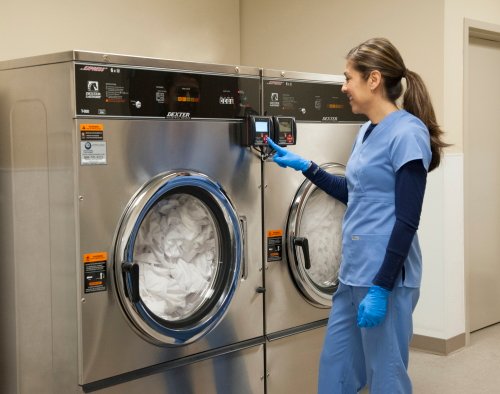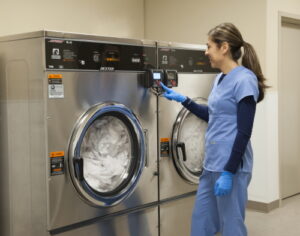The Top 10 Differences Between a Commercial Vs Residential Washers and Dryers

Here we are going to explain difference between a commercial Vs residential washers and dryers
The average American family washes about 300 loads of laundry each year. If you run a commercial establishment, such as a salon or other on-premise laundry (OPL), you are likely to have much more laundry going through your washer and dryer. You will find that even a large residential washing machine is not up to the job. Such a machine may turn out to be too slow, inefficient, too time-consuming to operate, or turn out not to be able to stand up to the high-volume demands placed on it.
There is a compelling alternative: A commercial washer and dryer. If you decide to buy a commercial unit, you will usually need to spend more than you would for a home appliance, but the savings in time and maintenance are well worth the cost. Before making that choice, you will want to know how exactly a commercial appliance is different from the residential models for which you may be familiar. What follows are ten ways in which commercial laundry machines are different than residential machines.

Ten ways commercial washer-dryers are different (and better) for your needs:
- More robust features: Commercial washing machines need to satisfy the washing requirements of a wide range of industry-specific settings. They also tend to come with features such as automated detergent and softener release, along with a large number of programmability options. For example, the Dexter O-Series machines improve productivity and quality with easy-to-use industry-specific settings. These settings include up to 100 programmable cycles, 20 programmable stages, ten chemical injection ports, soaking options, and speed spins. None of these features are available on standard residential units.
- Speed of operation: Residential dryers tend to be inefficient when it comes to extracting water from articles, which in turn makes them use more energy. Using higher G-Forces leads to less water left in the goods after the wash program is complete. The result of this efficiency is shorter drying times (or faster ironing), and reduced energy consumption to dry or finish the goods.
- Ease of repair: Commercial machines are designed to reduce costly downtime. Some, like the Dexter O-Series washers, are designed with heavy-duty bearings in a cast iron housing, welded steel spider and shaft, and a rugged frame to withstand an extreme 1,000-hour out-of-balance test. If, for some reason, repairs are needed, most parts are easily replaceable and accessible with simplified access to critical components.
- Capacity: Buying a residential washer-dryer unit, you’ll struggle to find anything that accepts loads over five cubic feet (12 to 16 pounds of laundry). Commercial machines, like the Dexter O-Series Commercial Washers, on the other hand, can handle up to 90 pounds of laundry (13+ cubic feet).
- Price: If you decide to buy a commercial washing machine, you can end up spending five times as much as you would for the average domestic washing machine. Commercial units tend to be available for lease, enabling you to get one with minimal upfront investment. Speak with your AAdvantage representative for details on our leasing programs.
- Build-quality: Commercial washing machines come supplied with heavy-duty suspensions, sound deadening panels, and solid mounts that reduce vibration. They tend to be quieter.
- Moisture Detection: Today’s commercial machines use the latest technology to monitor your laundry for moisture, thereby stopping the cycle when the articles reach their desired dryness level. By preventing over-drying, the life of your linens can is extended. You will also notice a cost reduction in utilities and labor due to the increased throughput.
- More robust wash action: If you prefer a machine capable of delivering vigorous cleaning action, commercial washers have wash programs that can perform more vigorously than residential washing machines.
- Durability: Washing machines are specified for the number of loads they will handle over their lifetimes. An entry-level residential washing machine is typically designed to last between 2,500 and 3,500 washing cycles. Commercial washing machines, on the other hand, are designed for 30,000 or more hours of operation, which makes them suitable for far longer. Residential machines are also likely to fail more readily when overloaded regularly; commercial washers tend to hold up better to overloading. You will save money on repair costs in the long run.
- Warranty: Household washing machines, depending on the manufacturer, usually come with two-year warranties. Commercial washing machines, on the other hand, often come with 10-year warranties on major components and a 3-year warranty on the rest. Some manufacturers even include lifetime technical support.
You may like to read : 12 Essential Equipment & Tools for Laundry Room
Should you buy a commercial washing machine and dryer or lease one?
If you find it hard to afford a commercial washer and dryer, you should know that leasing programs tend to be popular amongst our clients. AAdvantage offers finance specials through Dexter Financial Services (DFS) or Eastern Funding that can ease the impact on your bottom line.
Leasing your machines means you don’t need to make a large upfront payment to meet your needs, leasing also takes care of preventative maintenance, repairs, and labor costs, which are built into the program. Should your equipment fail during the lease period, AAdvantage assumes responsibility for fixing it.
AAdvantage has the most extensive service team in the south with 14 techs and six master techs to serve our customers. And note that AAdvantage Laundry stocks parts for most major appliances in our warehouse, reducing time to repair.
Whether you prefer to buy or lease, a commercial washer and dryer can be a good idea if you need aa robust and capable set of laundry appliances.
Contact an AAdvantage Laundry systems representative for more information and to help select the right commercial washing machine and dryer for your needs.
You may interested to read about Benefits of Maytag Commercial Laundry Equipment








